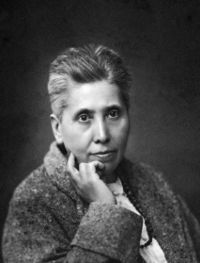Difference between revisions of "Kamensky, Anna Alexevna"
EncycloSysop (Talk | contribs) (Created page with '(1867-1952). Russian theosophist responsible for the early growth of the Theosophical Society (TS) in Russia. Kamensky joined the TS in 1899. She was born on August 25, 1867 in P…') |
|||
| (2 intermediate revisions by 2 users not shown) | |||
| Line 1: | Line 1: | ||
(1867-1952). Russian theosophist responsible for the early growth of the Theosophical Society (TS) in Russia. Kamensky joined the TS in 1899. She was born on August 25, 1867 in Pavlovsk near St. Petersburg in Russia of Russian nobility on August 13, 1867, and educated at Geneva College and Petrograd Women’s University. Her doubts regarding orthodox religious dogma caused her to leave the Greek Church in 1887. During the summer of 1902 Kamensky met Annie BESANT and became her student. Following her period with Besant, Kamensky succeeded in obtaining legal status for the TS in Russia and the theosophical work prospered there for a time. | (1867-1952). Russian theosophist responsible for the early growth of the Theosophical Society (TS) in Russia. Kamensky joined the TS in 1899. She was born on August 25, 1867 in Pavlovsk near St. Petersburg in Russia of Russian nobility on August 13, 1867, and educated at Geneva College and Petrograd Women’s University. Her doubts regarding orthodox religious dogma caused her to leave the Greek Church in 1887. During the summer of 1902 Kamensky met Annie BESANT and became her student. Following her period with Besant, Kamensky succeeded in obtaining legal status for the TS in Russia and the theosophical work prospered there for a time. | ||
| + | |||
| + | [[Image:TE_KamenskyAnna.jpg|thumb|200px|<center>''Anna Alexevna Kamensky''</center>]] | ||
| + | |||
After 1917 the Bolshevik Revolution systematically imposed a materialistic philosophy in Russia and the Theosophical Branch was closed in December 1919; the members had been asked to teach atheism and Kamensky, as leader, refused and with other members escaped from Russia in disguises. | After 1917 the Bolshevik Revolution systematically imposed a materialistic philosophy in Russia and the Theosophical Branch was closed in December 1919; the members had been asked to teach atheism and Kamensky, as leader, refused and with other members escaped from Russia in disguises. | ||
| − | In Geneva, Kamensky and others founded an International Theosophical Center with the object of coordinating the work of movements dedicated to the spiritual welfare of humanity. This Center under Kamensky’s direction lasted until 1937. She earned a Ph.D. at Geneva University with a thesis on the Bhagavad-Gita. In 1926 she was appointed Professor of Comparative Religion at the Geneva University. | + | |
| − | Publications include: ''The Role of the Bhagavad-Gita in the Religious Movement of India; Bhagavad- | + | In Geneva, Kamensky and others founded an International Theosophical Center with the object of coordinating the work of movements dedicated to the spiritual welfare of humanity. This Center under Kamensky’s direction lasted until 1937. She earned a Ph.D. at Geneva University with a thesis on the ''Bhagavad-Gita''. In 1926 she was appointed Professor of Comparative Religion at the Geneva University. |
| − | P.S.H. | + | |
| + | Publications include: ''The Role of the Bhagavad-Gita in the Religious Movement of India; Bhagavad-Gītā'' (French Translation); ''Bhagavad-Gītā'' (Russian Translation). | ||
| + | |||
| + | |||
| + | [[Contributors|P.S.H.]] | ||
| + | |||
| + | |||
With corrections on dates and names, courtesy of Konstatin Zaitzev. | With corrections on dates and names, courtesy of Konstatin Zaitzev. | ||
Copyright by Theosophical Publishing House, Manila. | Copyright by Theosophical Publishing House, Manila. | ||
Latest revision as of 07:25, 14 March 2012
(1867-1952). Russian theosophist responsible for the early growth of the Theosophical Society (TS) in Russia. Kamensky joined the TS in 1899. She was born on August 25, 1867 in Pavlovsk near St. Petersburg in Russia of Russian nobility on August 13, 1867, and educated at Geneva College and Petrograd Women’s University. Her doubts regarding orthodox religious dogma caused her to leave the Greek Church in 1887. During the summer of 1902 Kamensky met Annie BESANT and became her student. Following her period with Besant, Kamensky succeeded in obtaining legal status for the TS in Russia and the theosophical work prospered there for a time.
After 1917 the Bolshevik Revolution systematically imposed a materialistic philosophy in Russia and the Theosophical Branch was closed in December 1919; the members had been asked to teach atheism and Kamensky, as leader, refused and with other members escaped from Russia in disguises.
In Geneva, Kamensky and others founded an International Theosophical Center with the object of coordinating the work of movements dedicated to the spiritual welfare of humanity. This Center under Kamensky’s direction lasted until 1937. She earned a Ph.D. at Geneva University with a thesis on the Bhagavad-Gita. In 1926 she was appointed Professor of Comparative Religion at the Geneva University.
Publications include: The Role of the Bhagavad-Gita in the Religious Movement of India; Bhagavad-Gītā (French Translation); Bhagavad-Gītā (Russian Translation).
With corrections on dates and names, courtesy of Konstatin Zaitzev.
Copyright by Theosophical Publishing House, Manila.
